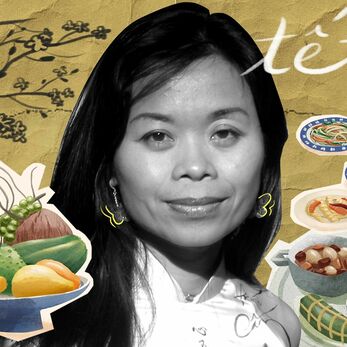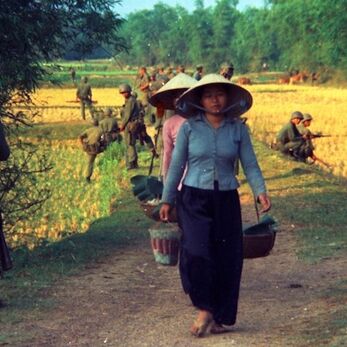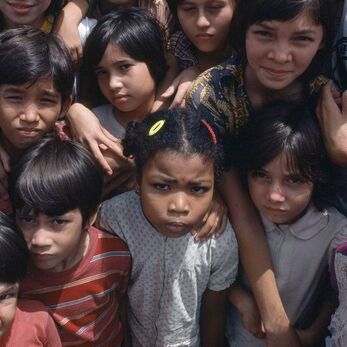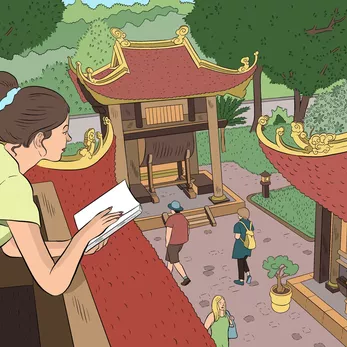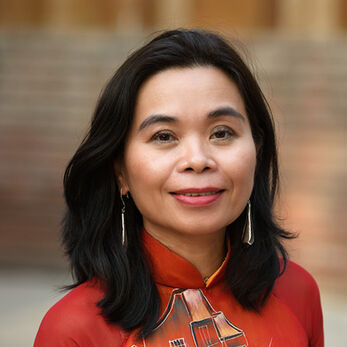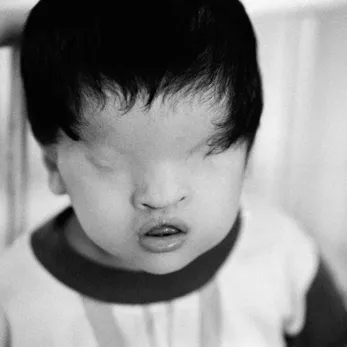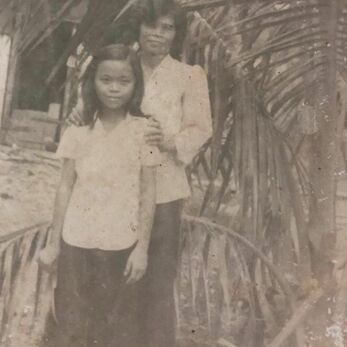Looking to the past, a daughter sees her family in new ways.
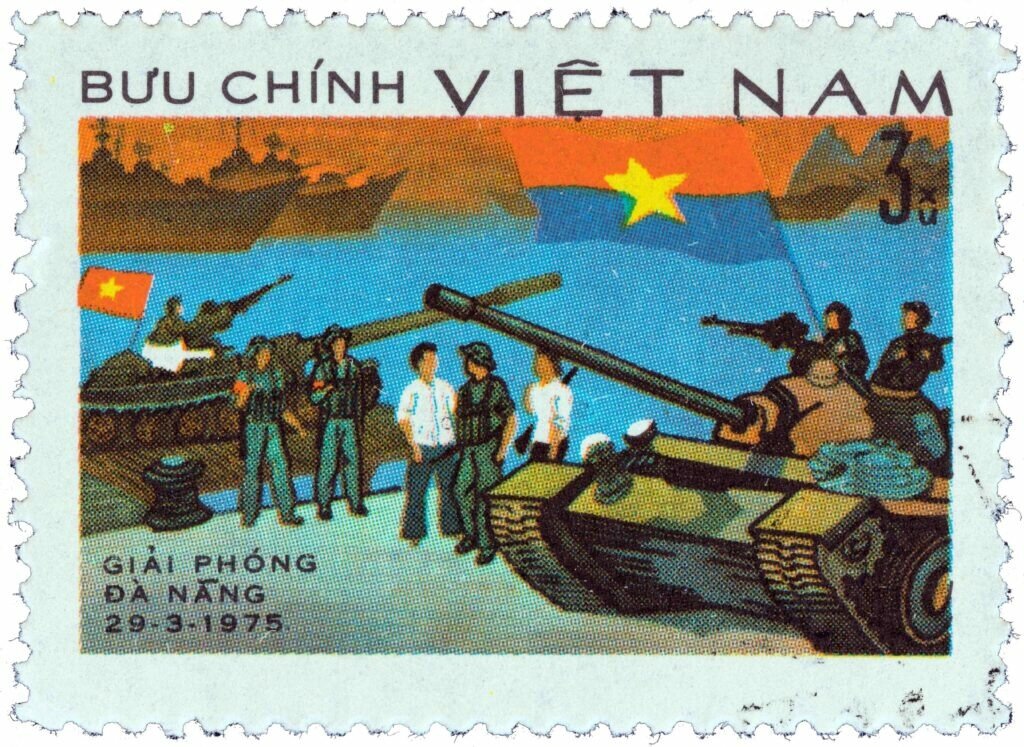
Do you know that I have an uncle missing since 1945 during the Great Hunger?” my father recently asked me over the phone. When I told him I didn’t know, that he had never told me such important and heart-breaking information, I realized that I still have so much to learn about my father. His personal history is as complicated as the history of Vietnam itself, and like many Vietnamese people, he has had to bury many experiences deep under the layers of time in order to move on, to survive.
I once considered my father absent from my life. I have few memories of him during my earliest years growing up in Khương Dụ Village, Ninh Bình Province. Shortly after the end of the Vietnam War—officially known in my homeland as “The Resistance War against America to Save the Nation”—my father ventured from our home village in the North to Bình Dương Province in the South to work as a teacher. He came home perhaps once a year, and whenever he did, his friends and our neighbors would gather at our home, wanting to hear stories from the faraway South. In our village, people always kept their doors open to welcome unexpected visitors, and my family did the same, the consequence being that there were always other people present to compete for my father’s attention.
My father is a charming storyteller, renowned in our village as handsome, his eyes always lighting up or darkening his angled face depending on what types of stories he’s telling. As our neighbors gathered to listen to him, a sense of admiration for him took root in me and grew tall and strong, like the gạo tree that stood at the entrance of our village. And like the gạo tree that bloomed brilliant red flowers, I told my friends proudly about my father, of his bravery in traveling so far away from home, of him being so knowledgeable about the world.
Little did I know that that pride and admiration would soon be shattered.
In 1979, when I was six years old—four years after the war’s end—my father came home and told my grandfather, my mother, my brother and me that we needed to migrate to the South; the weather and our lives would be better there. The storms and floods that frequently destroyed our garden and rice field would no longer threaten us, the schools would have better resources, and food would be more abundant and easy to grow. Even though I felt torn about leaving our relatives and friends behind, I was excited to unite with my eldest brother, who was four years older than me and had moved South with my father two years earlier.
So I helped pack the few sets of clothing that we owned, as well as our pans and pots, and got ready for the long journey that would take us more than 1,600 kilometers down Vietnam, crossing the Bến Hải River which had once slashed our country into two, North and South, for more than twenty years. Together with my father, we traveled for several days and nights on trains and buses to reach Bạc Liêu, a town that dangled on the southern tip of our newly united country. Even though my new home was next to the town’s cemetery, where grass and bushes grew wildly next to neglected graves and where fireflies flickered at night like eyes of wandering ghosts, I told myself I needed to love this house—it was the best my parents could afford with their life savings. I told myself to ignore the cemetery and my fear of ghosts to be able to fully treasure the garden: the coconut trees that stood tall and strong, bearing heavy bundles of fruit, the pond whose surface was lit up by mướp flowers and rippled by twirling tails of fish, the mango tree whose flowers looked like bursting stars.
On the first night after our arrival, when the joy of the reunion with my eldest brother was still bubbling in my chest, I sat down for dinner with my family. My grandfather and mother were asking my father about our new neighbors, whom we expected to be welcoming to us, just like those in our village, when our bodies suddenly jumped—large rocks were exploding like bombs above our heads as they struck our home’s tin roof. There was no electricity, and as my father peered out our door into darkness, shouting at whoever had hurled the rocks toward us, fear enveloped me. Fear of the unknown. Fear that my father would not be able to protect us.
The fear only got worse as rocks continued to erupt above our heads, night after night. When I ventured outside, whether to go to school, to work in our rice field, or for a walk with my grandfather or brothers, I would hear the bullies chant insults about Northerners.
It would take me years to understand the deep roots of the resentment that some of our new neighbors felt toward us: their family members had battled against the North during the war, and they saw us Northerners as invaders who were there to take their jobs, which was somewhat true because many Northerners were being sent by the new government to take over positions once occupied by Southerners. It would take me years to fully recognize that my Southern neighbors were suffering, too: many were waiting for news from relatives who had been captured and sent to reeducation camps; some had seen their properties nationalized as part of the new government’s effort to punish capitalists; some were attempting to flee the country by boats and join the hundreds of thousands of Vietnamese boat refugees.
My parents and grandfather were unable to discuss these sensitive issues with me, and I was too young to figure them out by myself, so I resented my father for uprooting us from our relatively peaceful life in the North to plant us in a turbulent new life in the South. All I wanted was to return to our home village, where I could climb trees with my friends, row out to the middle of the village pond with my raft built from banana trunks, ride on the backs of water buffaloes and fall asleep in our hammock to the lullabies sung by the bamboo grove my grandfather had planted at the back of our garden.
I refused to believe my father, who kept reminding my two brothers and me why he had brought us to the South: an opportunity to advance our studies so that one day, we could attend universities. Neither of my parents had studied beyond high school, and it was their goal to have their children do better. My father reminded us that up until then, no one in our village in Khương Dụ had been able to attend university, and if we stayed back, we would suffer the same fate.
Clouded by anger, I failed to acknowledge the many things my father did for me: the books that he brought home for me to read, the bookshelf he built, the long hours he worked so we had enough food to eat. I only paid attention to how hard he made us work: from growing rice and vegetables to selling them on the streets or at markets. Once, my father made my brothers and me help him water our rice field after it hadn’t rained for weeks and the field was so thirsty that the soil cracked. Under the intense sun, my brothers and I sweated profusely as we struggled to carry bucket after bucket of water from a faraway creek. Watching the water disappear into the parched, unquenched soil, I felt anger boil inside of me. My father seemed oblivious to my feelings, his toes splayed out onto the dirt road as he walked, carrying full buckets of water tethered onto a bamboo pole balanced across his shoulders. Only now, looking back through the years, I could see how thin he had become. His cheeks were hollowed, his face wrinkled, but his eyes were still expressive and determined.
What I noticed most about my father at that time, though, was how unnecessarily thrifty he was. We had a fish pond, and when the fish were big enough, my father would make us dry them and eat them all year long instead of selling them. He reasoned that if we sold the fish, we would have to buy new fish at a higher price.
It wasn’t until much later, when I had read enough and learned about Vietnam’s complicated history, that I spoke with my father about his past and discovered why he acted the way he did: fear of hunger. My father’s mother, youngest brother and uncle had all died in the Great Hunger of 1945 in horrific circumstances—circumstances that I would later fictionalize in my novel, The Mountains Sing. Having barely survived the Great Hunger, the French occupation, the Japanese invasion of our homeland and the American War in Vietnam, my father could never take anything for granted. He always wanted to make sure that we would have food in our home so that none of us would ever be hungry again. Having witnessed so much death and starvation and in recognizing how fragile peace could be, my father learned the importance of self-dependence, hard work and resilience, and he wanted to instill in his children his strong work ethic: the work ethic that made me into the writer I am today.
My father’s love for literature and the books he brought home enabled me to travel far as a child. And today, as I write, I become closer to him and to my mother. In researching and writing about Vietnam and our family’s history, I have come to understand the roots of my parents’ trauma, the reasons for many of their behaviors, their sacrifices and the many difficult decisions they have had to make.
Since the phone call with my father about his missing uncle, I have talked to him several times about this traumatic period of his life, about the relatives he lost and about the possible ways we could search for his uncle. We don’t know if we will ever find my great uncle, who was called Khôi before he went missing, or discover what really happened to him, but I know I will learn many things about myself, my family and my country when I get to travel with my father further back into his past. And just as he once worked so hard in his rice field, I will keep ploughing my field of words until I find the answers to the questions I have about my heritage. As I once wrote about my father in my poetry collection,
Through hungry seasons, the village hill was steep,
people bending their backs, patiently tending their seeds,
their gazes haunted by cracked fields.
My father still believed, still ploughed and hoed,
the village roads fragrant again with the scent of freshly cut hay.
Storms come, destroy the gạo tree at the village gate,
but the bamboo grove gave birth to new seasons of young plants.


